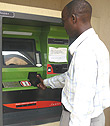Today, you are most likely to benefit from the use of an electronic card in your day to day life. It begins with your mobile phone sim card, to your bank’s Automated Teller Machine (ATM) card, your Nakumatt Loyalty card, your DStv card, your office card key, to name but a few.


Today, you are most likely to benefit from the use of an electronic card in your day to day life. It begins with your mobile phone sim card, to your bank’s Automated Teller Machine (ATM) card, your Nakumatt Loyalty card, your DStv card, your office card key, to name but a few.
In order to keep up with global pace, these small square cards we carry in our wallets make our life much easier. Remember when you get that emergency that requires hard cash immediately and all you have to do is run to an ATM machine. Or when you your mother in the village is very sick and all she has to do is send a text message.
Automated cards come in two forms of technology. There is older magnetic strip technology popularly used in credit cards and ATMs, and Rwanda national IDs.
However the data on the strip can easily be read, written, deleted or changed with off-the-shelf equipment. Therefore, the strip is really not the best place to store more sensitive information.
The smart card is a safer technology. It’s usually a golden computer chip which has a microprocessor like the one embedded at the back of your sim card or on the Nakumatt cyber cash card.
The sim card for example contains your phone numbers, text messages, pictures all configured to your phone number as long as it is in active use.
Because of the enhanced security benefits of the smart card, many countries have began to implement an identification scheme which each citizen can use.
In Malaysia, a smart identity card that has 8 different applications is currently in use.
In Mendoza, a province of Argentina where a high level of road accidents, driving offenses, and a poor record of recovering outstanding fines were prevalent, smart licenses keep an up-to-date record of driving offenses and unpaid fines.
They can also store personal information, license type and number, and a photograph of the holder and emergency medical information like blood type, allergies, and fingerprints. Rwanda is not far behind.
This year, through The National ID Project, all purpose electronic smart cards, which will enable Rwandans to identify themselves, access services such as insurance and banking services will be launched.
Smart cards are also a secure way of purchasing goods on the internet, but not always. The most controversial problem with smart cards is the fact that the private information can be easily retrieved and misused without the user’s knowledge or approval.
For example if your identity card contains your confidential health records, employers or insurance companies can misuse the information.
Financial records can be used to steal from your bank accounts as is the case with computer hackers who can access your credit cards and use it to commit financial fraud.
Another problem is breakage due to poor handling. Since the most logical place for example for a man to keep their cards is the wallet which is stuffed in their trouser back pocket, it implies that several times in a day, you will be sitting on the card.
The card can be protected by a rigid card holder that will not bend in most circumstances. To avoid breakage of the phone sim card simply minimize handling, or constant removal or changing of cards in the same phone. You can invest in a dual sim card phone, which can keep both your sim cards active and minimize handling in the process.
In Europe also, hackers have found a way to clone Pay TV smart cards such that viewers can access channels without subscribing.
KCB, a Kigali bank with regional outreach is set to introduce an ATM card with smart card technology so that accountholders can use any ATM machine in any of the East African locations without a hitch.
In many other countries the security challenges faced by use of smart cards are kept at bay by the fact that a thief needs to steal both the card and the password which gives access to the information that it contains.
However the benefits of smart card technology far outweigh the problems accrued to them. Fraudulent use of the smart card’s private key is less likely because the attacker has to both steal the card and know the user’s password or PIN according to David Chadwick, a senior lecturer in the Information Systems Institute at the University of Salford, Manchester, England.
All in all, smart cards are the new way of life in the 21st century and sooner all later, all important personal information will be only a smart card away.
Contact: kelviod@yahoo.com


